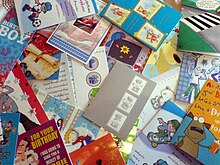Birthday card

A birthday card is a greeting card given or sent to a person to celebrate their birthday. Similar to a birthday cake, birthday card traditions vary by culture but the origin of birthday cards is unclear.[1] The advent of computing and introduction of the internet and social media has led to the use of electronic birthday cards or even Facebook posts to send birthday messages.[2]
Meaning and research

As written in the encyclopedia Celebrating Life Customs Around the World, birthday cards are the "most popular greeting card to send and account for around 60 percent of all greeting cards bought" (Williams).[1] Birthday cards are an important part of different cultures, including, American culture.[3]
These cards deliver different meanings, both on a personal and cultural level.[4] Research suggests that birthday cards may be "indicators of societal attitudes towards aging, communication of love, and gender-based expressiveness."[3] For example, one study analyzing 150 birthday cards in 1981 found negative views on aging portrayed through humor.[5] A 2017 study of online greeting cards found similar portrayals.[4] Because of the ubiquity of the sentiments in cards, sociologist Dana Sawchuk recommended replicating this research with undergraduates as a form of active learning.[6]Birthday cards can be written or printed for anyone, be it father, husband or a friend. [7]
In attempt to prevent high-risk drinking at 21st birthday celebrations in the United States, several public health studies have used birthday cards to try to modify drinking behavior. A 2009 survey of the attempts "indicated that the birthday card intervention was not successful at reducing drinking or consequences".[8]
Notable cards
Notable birthday cards include:
- A birthday card from the people of Poland to the United States in 1926, as part of the Sesquicentennial of the United States.[9]
References
- ^ a b Williams, Victoria (2016-11-21). Celebrating Life Customs around the World: From Baby Showers to Funerals. ABC-CLIO. pp. 38–39. ISBN 9781440836596.
- ^ Kim, J.G. (December 12, 2015). Labor Saving and Labor Making of Value in Online Congratulatory Messages. Social Informatics: Proceedings of the 7th International Conference, SocInfo 2015. Beijing, China: Springer. pp. 245–260. ISBN 9783319274331.
- ^ a b J., Dodson, Kimberly; W., Belk, Russell (1996). "The Birthday Card Minefield". ACR North American Advances. NA-23.
{{cite journal}}: CS1 maint: multiple names: authors list (link) - ^ a b Zeman, Zdenko; Zeman, Marija Geiger (2017-04-25). "For Your Great and Important Day: Old Age, Humor and Online Birthday Cards". Narodna umjetnost. 1 (54): 49–67. ISSN 1848-865X.
- ^ Demos, V.; Jache, A. (1981-04-01). "When You Care Enough: An Analysis of Attitudes Toward Aging In Humorous Birthday Cards". The Gerontologist. 21 (2): 209–215. doi:10.1093/geront/21.2.209. ISSN 0016-9013.
- ^ Sawchuk, Dana (2016-10-14). "The birthday card exercise: Replicating research as active learning". Gerontology & Geriatrics Education: 1–10. doi:10.1080/02701960.2016.1247071. ISSN 0270-1960. PMID 27740894.
- ^ "Happy birthday wishes". Shristi Patni. Retrieved 12 Oct 2018.
- ^ Lewis, Melissa A.; Neighbors, Clayton; Lee, Christine M.; Oster-Aaland, Laura (June 2008). "21st Birthday Celebratory Drinking: Evaluation of a Personalized Normative Feedback Card Intervention". Psychology of addictive behaviors : journal of the Society of Psychologists in Addictive Behaviors. 22 (2): 176–185. doi:10.1037/0893-164X.22.2.176. ISSN 0893-164X. PMC 2758637. PMID 18540715.
- ^ Ruane, Michael E. (2017-07-02). "Poland once sent the U.S. a birthday card. With 5 million signatures". Washington Post. ISSN 0190-8286. Retrieved 2017-10-12.
Further reading
- Mooney, Linda A.; Brabant, Sarah (1987-01-01). "Deviance, deference, and demeanor: Birthday cards as ceremonial tokens". Deviant Behavior. 8 (4): 377–388. doi:10.1080/01639625.1987.9967757. ISSN 0163-9625.
